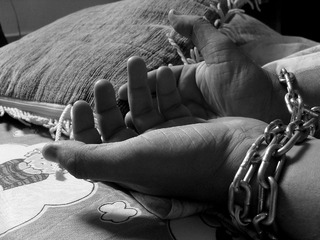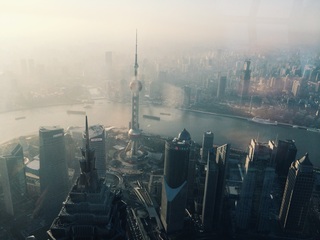Cheap, cheaper, cheapest – it is common knowledge that companies in China can produce at low costs, but unfortunately working conditions are also far worse than European standards. According to investigations and witnesses, modern slave labor is even practiced in Chinese prisons – the inmates, most likely, also produce goods that can be bought here.
WANTED: PRISONERS FOR MASS PRODUCTION
China’s prisons are not just for criminals. The Chinese government does not tolerate criticism or even rebellion against its policies, and prison sentences are threatened as a consequence. The prisoners therefore include numerous human rights activists, advocates of democracy and critics of members of the government. But it is not only the regime that benefits from the many imprisonments – the economy does too. China’s prisons are also labor camps where the convicts must work up to 15 hours a day in inhumane conditions. Huge quantities of goods are produced directly on the prison grounds for export all over the world.

NO SUCH THING AS FAIR TRIALS
Englishman Peter Humphrey is a witness to these conditions. He himself spent two years in a prison in Shanghai. Before that, he worked as a private detective for a Western company and was on the trail of a member of the Communist Party. The verdict was handed down without a transparent, fair trial – according to Humphrey, there are no fair courts in China. In most cases, the accused are forced to confess, which is broadcast on state television as a deterrent.
FORCED LABOR AND TORTURE

Another witness from Romania, who does not want to give his name out of fear, talks about everyday life in such a prison in a documentary. The memories of his stay still traumatize him today. Every morning he had to kneel before the prison guards and endure arbitrary violence depending on their whims. The prisoners were then herded like cattle to the factories, which were located directly on the prison grounds. They worked 12-15 hours a day, he says. Illness was no reason not to work. If you refused or were physically unable to work, you were put in solitary confinement and strapped down. There is also talk of electric shocks and beatings.
A HUMAN RIGHTS LAWYER’S MYSTERIOUS DEATH
The Nobel Prize winner, writer and leader of a civil rights movement Liu Xiaobo died of cancer during his 11-year imprisonment in a Chinese prison. Several countries – including the USA, Canada, France and Taiwan – had previously offered to take Liu in for treatment, but China refused. It is unclear whether he even received proper cancer treatment in prison. The circumstances surrounding his death have never been fully clarified. Officially, such forced labor camps no longer exist in China, but some ex-prisoners testify to their existence. The locations of most prisons are kept strictly secret.
THE INVOLVEMENT OF WESTERN CORPORATIONS
Another witness, a European businessman, spent eight years in a Chinese prison for commercial fraud. He now lives in Bangkok, but wishes to remain anonymous as he is still afraid of the Chinese government. In an interview, he tells us what he found out about the production chain between Western companies and Chinese prisons during his imprisonment and afterwards. From greeting cards, artificial flowers and clothing labels to pharmaceutical products such as FFP-2 masks and pregnancy tests, this witness says that just about everything is produced in prisons – the prisons generate huge profits for domestic and foreign companies. It is unclear how much the European companies known to us, which produce in China, know about this forced labor in prisons. Peter Humphrey says it is almost impossible for Western corporations to find out which products are made under such unacceptable conditions. The prisons in China are hidden and inaccessible to outsiders, making it very difficult to trace the opaque business connections.

AN ANONYMOUS CRY FOR HELP
In 2019, a Christmas card with an anonymous appeal for help caused a stir. A child in the UK had discovered a small handwritten note in the envelope stating that this greeting card had been produced under duress and that people should please contact an NGO to help the people in Chinese prisons. Peter Humphrey found out about this, visited, and interviewed this girl – and was then accused of having staged the whole thing. It was not possible to prove whether the message was genuine, but several such messages have already appeared around the world, for example in the packaging of a pregnancy test produced in China.
LAWS CALLING FOR MORE TRANSPARENCY
Activist and author Amelia Peng traveled to Shanghai, posed as an international businesswoman at several prisons she had painstakingly tracked down and feigned interest in a deal. The bait was a hit and so she provided the first evidence of forced labor in the prisons. She wrote a book about her findings entitled “Made in China”. Unfortunately, however, we have little influence on the structures that prevail in China. Even China’s “super-rich”, who might wish for a different, fairer China, are powerless and have great respect for the regime.
Last year, the EU passed the “Supply Chain Due Diligence Act” – an important step in the fight against forced labor, which violates human rights, but still far from a solution. According to the law, European companies are obliged to respect human rights and must ensure that their goods are not produced using forced labor. To this end, they must take preventative measures – but only as far as they can, and beyond China’s borders, they really have no influence over who produces their goods and under what conditions. Unfortunately, not producing in China at all is currently very unrealistic, economic wishful thinking. The revelations about modern slave labor in Chinese prisons cast a depressing shadow over the global supply chain. This disturbing reality demands that attention be drawn to this major problem, but also, once again, a critical examination of the origins of our consumer goods. It is best to buy local products to ensure that you are not supporting the abuses in Chinese prisons.
Translated by Emily Schiffer
#Slavelabor #Forcedlabor #China #Humanrightsviolations #Forcedlabor #Supplychains #AgainstHumanTrafficking #GegenMenschenHandel #EndExploitation #EndTrafficking #HopeForTheFuture #Austria
